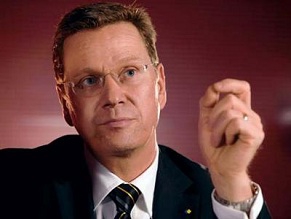|
World Jewish News

German Foreign Minister Guido Westerwelle: “I recommended looking for a solution together with the international community''
|
German FM: ‘political and diplomatic solution to Iran threat still possible’
24.09.2012, Jews and Society German Foreign Minister Guido Westerwelle insisted the international community is doing “everything to avoid” Israel making a strike on Iran over its contested nuclear programme, as he committed to defending Israel’ security.
In an interview published in German daily Die Welt, the German minister declared that the threat posed by Iran to Israel’s existence in itself “would already be a good reason to act. But we also need to prevent a nuclear arms race”, which he claimed would destabilise the entire region.
Despite appearing to reemphasise his rhetoric on meeting with Israeli Premier Benjamin Netanyahu in Jerusalem earlier this month, where he expressed Germany’s commitment to Israel’s security, he rather suggested caution. “I recommended looking for a solution together with the international community. Diplomacy is still possible,” before conceding that negotiations with Iran to date had not been “substantial”.
He also verified independent reports Sunday that he, along with his French and British counterparts, had appealed to EU foreign policy chief Catherine Ashton to “prepare for the next round of sanctions”, adding that “by now everyone sees that the sanctions are effective”.
Unnamed western officials later told AFP news agency that Westerwelle, British Foreign Secretary William Hague and French FM Laurent Fabius had written to Ashton saying that whilst they “think there is still time for a political solution, a diplomatic solution, and this is what we’re working for (but) we cannot accept nuclear weapons in the hands of Iran”.
Despite admitting that he “understands the concerns of Israel for its security”, Westerwelle spoke out in contrast to Netanyahu’s widely stated belief that sanctions were not succeeding in isolating Iran or forcing it to the negotiating table, insisting they had proved “effective”.
He also attempted to sidestep German Defence Minister Thomas de Maiziere’s comments earlier this month that a pre-emptive strike on Iran’s nuclear facilities by Israel would “not be illegitimate but also not very smart”, by insisting that Chancellor Angela Merkel’s administration was instead firmly focusing its efforts on a diplomatic solution.
Despite maintaining close links with Israel, Germany has also remained Iran’s largest European trade partner, with bilateral trade between the two nations thought to amount to €4 billion. It is also thought to be a firm opponent of calls within the EU to place Lebanese militant group Hezbollah, which Israel accuses of being Iran’s proxy, on a EU list of terrorist groups.
Despite the EU refusing Israeli Foreign Minister Avigdor Lieberman’s calls earlier this summer, at a meeting of the EU-Israel Association in Brussels, to outlaw the group, which it holds responsible for a deadly l attack on Israeli tourists in Bulgaria in July, insisting there was “no consensus amongst EU member states” for doing so, both British Foreign Minister William Hague and his Dutch counterpart Uri Rosenthal have led calls to ban Hezbollah in Europe. Holland already has a ban on the Lebanese group in place.
Controversial Iranian President Mahmoud Ahmadinejad is currently in New York for a meeting of the UN General Assembly this week, where he will meet international negotiators in a latest attempt to reinvigorate stalled diplomatic talks. Having already met with Un Secretary-General Ban Ki-moon, he is expected to use the platform to defend Iran’s contested nuclear weapons programme, which it claims is for peaceful motives.
In an interview with the Washington Post Sunday, Ahmadinejad rejected the threat of military action by Israel, insisting that “we, generally speaking, do not take very seriously the issue of the Zionists and possible dangers emanating from them”.
Dismissing calls from the Jewish State as “a lot of noise to raise stakes in order to save themselves”, he warned that “Iran is also a very well-recognised country ad her defensive powers are very clear”.
Rejecting accusations by Israeli and other international powers that Iran was using diplomatic talks to “play for time” so it could continue to meanwhile pursue its uranium enrichment plans, Ahmadinejad appeared to redirect blame on the US, insisting “we have always been ready” to negotiate, “but experience has shown that important and key decisions are not made in the US leading up to national elections” (the US presidential elections on November 6).
Implying that the Israeli administration was trying to lobby US President Barack Obama to support military action to further its own agenda, he added: “Will the people of the US accept meddling and intervention in the affairs of other? I don’t believe so. I believe the people of the US are peace-loving people.”
EJP
|
|
